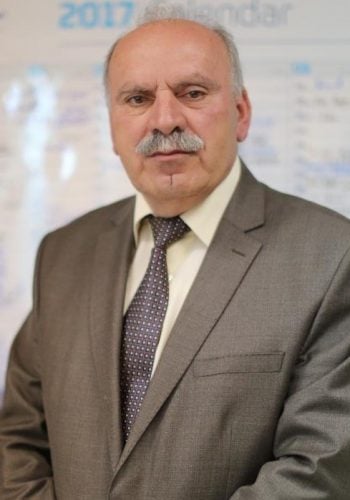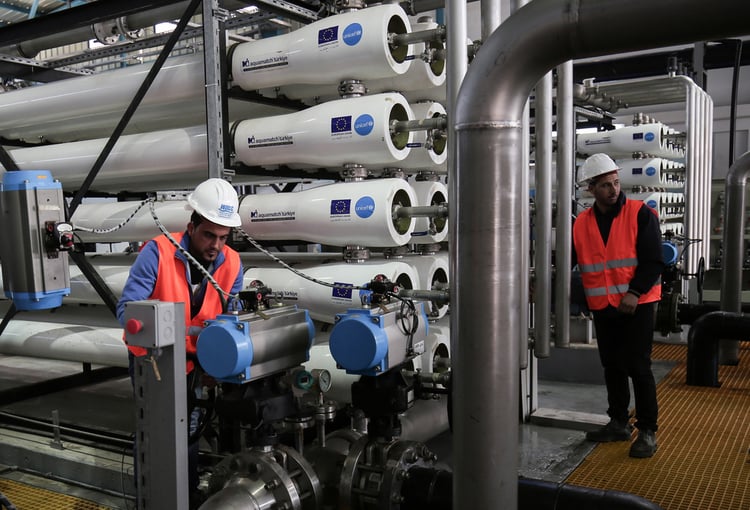By: Rossella Messina
Mohammad al-Hmaidi explains the challenges and achievements of the newly established Water Sector Regulatory Council (WSRC), an institution that began its work in 2016 under the new Water Law in Palestine.[1]
What are the main challenges for the Palestinian water sector right now?
The first problem is water availability. While it is true that water reaches almost every household in Palestine, the distribution is unbalanced. Certain areas have continuous supply while others receive it once a month. Some communities under Israeli control can get water only through tanks. This brings us to the second issue, water tariffs. The water price varies from 1.5 to 40 Israeli Shekels ($0.43-$11.4), and usually the higher prices are for people in the areas that are harder to reach. The system is unfair.
Water losses are another problem. In a water-scarce country like Palestine, where in some cases availability is 12 litres/capita/day, the general losses can be up to 28%, which is too much.
In some communities, losses go up to 50%. This means that there is mismanagement. Policymakers need to look again at the policies, for instance to find more suitable crops. We are growing crops that require a lot of water, and when we export them, it is like exporting our water. We simply cannot afford that.

Photo 1: Dr.Mohammad Al Hmaidi
CEO, Water Sector Regulatory Council.
How can these challenges be addressed and what is the WSRC’s specific mission?
The WSRC can take action at an institutional and infrastructural level but not at a political level, as Palestinians are not in control of their water resources. The regulator has different mandates. The first task is to issue licences to service providers, for both drinking and wastewater, given that they comply with certain conditions. The main condition is that they have to set equitable tariffs. Once they suggest a tariff for their services, the WSRC has the right to review it and give its approval, and then to monitor their compliance. The other main task it to come up with incentive programmes to develop projects and to evaluate the ones that are efficient and should continue. Finally, all data on key indicators – financial, institutional, technical and gender related – are monitored each year, verified and then published on our website as raw data, so that everyone can access them directly.
What are the main obstacles facing the WSRC?
The main problem is that there is no complete legal set-up. The absence of by-laws is hindering me from doing my job. For instance, a month ago an agreement was made that we could work in Area C, but we still need official approval. The Joint Water Committee has to meet to discuss it, and then it has to take it to the security level, then political and infrastructural. It takes a long time, so although the agreement has been reached, it is still far from being applied.[2] Then there is the financial limitation, as there is no budget to build infrastructure. Many donors are not interested because the infrastructure built in Gaza was destroyed during the war. For instance, even if we build a desalination plant in Gaza, there is no assurance that it will not be destroyed again. Then again, even if it was built and it provided enough water, we do not know if the people in Gaza could afford it because desalinated water is expensive – almost one dollar per cubic metre.[3] Another issue is maintenance. How can people whose income is below the poverty line maintain the water facilities? So, financing both to build and maintain the infrastructure is a problem. Overall, the problem is that there is no trust from the communities and the private sector because of the lack of a complete legal system. Only when that is in place will the private sector get involved.
Photo 2: Palestinian employees work at a desalination plant during the inauguration of the first phase of the project on January 19, 2017, in Deir el-Balah in central Gaza. (Source: AFP).
What are the main projects for the coming months?
The biggest project is building the desalination plant in Gaza, which will cost $600 million.[4]Then, since wastewater collection in the West Bank is limited to 30%,[5] huge investments are needed to build infrastructure for wastewater reuse. The third issue is obtaining documentation of the available water supply. We need to know how to supplement water resources because there is simply not enough groundwater. Finally, we need to make sure that the available quantity is well managed, and that the government and the service providers are committed to improving the efficiency of the water sector and minimizing customer complaints.


